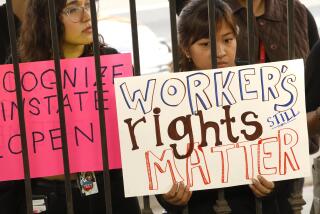Smithsonian Exhibit Plan Wins Backing
- Share via
The Smithsonian Institution won some important congressional support Thursday for its plan to mount an exhibition displaying the slave-like conditions at the infamous El Monte sweatshop.
One day after the Smithsonian came under fire from trade groups representing retailers and apparel manufacturers, U.S. Rep. George Miller (D-Martinez) began circulating a letter asking his congressional colleagues to send the museum messages of support.
“Americans have a right to know about the history of sweatshops in this country,” he wrote. “An exhibit on sweatshops will help us learn about this problem and continue the dialogue about possible solutions.”
Also voicing support for the display Thursday was former U.S. Labor Secretary Robert B. Reich, who is to provide a videotaped narrative about the history of sweatshops for the show.
“The Smithsonian is not an infomercial,” he said. “No industry group has the right to tell the American people what they should see or hear.”
Miller’s action might well forestall a repeat of the 1995 controversy over the Smithsonian’s planned exhibition on the dropping of the atom bomb on Japan by the B-29 Enola Gay. That show was canceled in response to criticism from veterans groups and members of Congress that it focused too much on the suffering of the Japanese victims and not enough on Japan’s war record and the strategic reasons for dropping the bomb.
In this case, the National Retail Federation, the American Apparel Manufacturers Assn. and other retail and apparel trade groups are up in arms over the museum’s plan for a show titled “Between a Rock and a Hard Place: A Dialogue on American Sweatshops, 1820-Present.”
The centerpiece of the show, scheduled to open April 15 at the National Museum of American History on the Washington Mall, will be a re-creation of the work space of the El Monte sweatshop, where about 70 Thai immigrants were found working in conditions of peonage in 1995.
The trade groups have complained that the exhibit plan is unbalanced and negative and would minimize their industries’ positive contributions to American life. One California trade group said it would send protest letters to Congress in a bid to change or block the exhibit.
Miller said he launched the campaign because he is concerned that industry criticism might lead to the cancellation of the project.
“I hope this doesn’t become another Enola Gay,” he said.
Industry officials, however, on Thursday repeated their calls to moderate the thrust of the exhibition.
“We want a balanced exhibition and El Monte should be part of it,” said Ilse Metchek, executive director of the California Fashion Assn. “But we won’t stand for a diatribe against our industry.”
More to Read
Sign up for Essential California
The most important California stories and recommendations in your inbox every morning.
You may occasionally receive promotional content from the Los Angeles Times.










